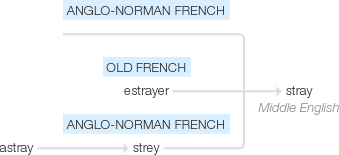Stray
Middle English: shortening of Anglo-Norman French and Old French estrayer (verb), Anglo-Norman French strey (noun), partly from astray.
wiktionary
From Middle English stray, strey, from Anglo-Norman estray, stray, Old French estrai, from the verb (see below).
From Middle English strayen, partly from Old French estraier, from Vulgar Latin via strata [1], and partly from Middle English strien, streyen, streyȝen(“to spread, scatter”), from Old English strēġan(“to strew”).
From Middle English stray, from the noun (see above).
etymonline
stray (v.)
c. 1300, a shortening of Old French estraier "wander about, roam, drift, run loose," said of animals, especially a horse without a master, also of persons, perhaps literally "go about the streets," from estree "route, highway," from Late Latin via strata "paved road" (see street). On another theory, the Old French word is from Vulgar Latin *estragare, a contraction of *estravagare, representing Latin extra vagari "to wander outside" (see extravagant). Figurative sense of "to wander from the path of rectitude" is attested from early 14c. Related: Strayed; straying.
stray (n.)
"domestic animal found wandering," early 13c., from Anglo-French noun use of Old French estraié "strayed, riderless," past-participle adjective from estraier "to roam, drift, run loose" (see stray (v.)).
stray (adj.)
c. 1600, of animals; 19c. of persons and things, from stray (n.) and in part a shortening of astray.
